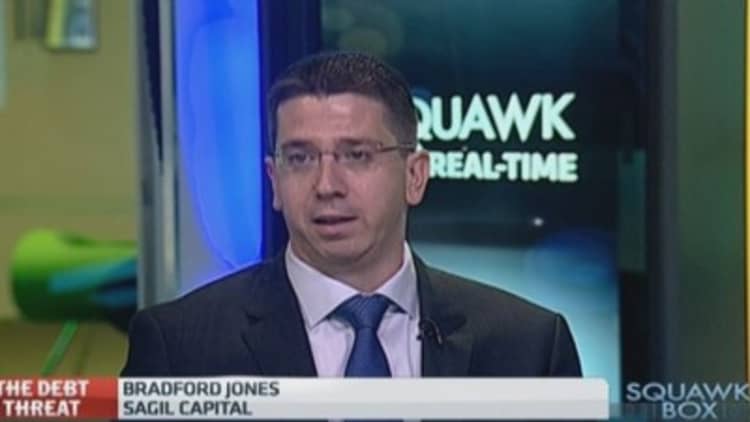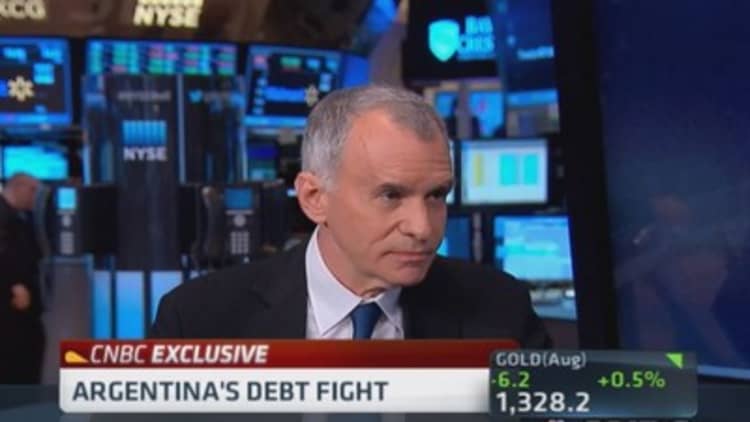Argentina is on course to default on its debt for the third time in 28 years on Wednesday – an event that could cost U.S. hedge funds millions of dollars and provide investors with yet another worry amid geopolitical turmoil.
The Latin American country has just two days to comply with a U.S. legal ruling to repay $1.3 billion to so-called holdout creditors, who snapped up junk bonds around the time of its massive $82-billion default in 2001 and refused to accept the debt restructurings that followed. At the same time, the country has to find $539 million to pay interest on restructured debt. The Buenos Aires government has warned that it won't be able to pay.
If Argentina fails to repay in full – or strike a deal with those involved – it will enter partial default.
A solution before the end of July seems unlikely, although Argentine officials will conduct further negotiations with creditors in the U.S. on Tuesday, according to media reports. At the start of the month, credit ratings agency Standard & Poor's placed Argentina's CCC- rating on "CreditWatch with negative implications", signaling its expectation of a default.
"The only possibility to avoid default now is for the holdouts to request the judge to put the ruling on hold," said IHS Country Risk Latin America Analyst Carlos Caicedo in a research note on Monday.
"If the judge does that, Argentina would be able to pay the exchange bondholders what is due to them on July 30, avoiding default. Argentina is adamant that only under these circumstances – a stay on the ruling – would it consider negotiations with the holdouts."
Baring a stay, Caicedo and other analysts forecast the only course of action would be for Argentina to default.
"Argentine authorities seem to have reached the conclusion that to default now and renegotiate later would the less costly option," said Caicedo. "If Argentina does not choose to default and opts to pay the holdout creditors, this carries the risk that those bondholders that agreed to restructure defaulted debt in 2005 and 2010 would demand a similar treatment."

'Choosing to default'
At the center of the dispute is NML Capital, a subsidiary of Elliott Management Corporation, the hedge fund run by billionaire Paul Singer. Prior to Argentina's 2001 default – the world's biggest by a sovereign – NML Capital had bought Argentine bonds at a deep discount, paying $48.7 million for debt worth $832 million at face value, according to some reports.
Subsequently, NML Capital has fought a 12-year battle to force Argentina to repay its debts in full, rather than with the haircut agreed to by around 93 percent of investors following restructurings in 2005 and 2010.
Tensions peaked last month, when the U.S. Supreme Court refused Argentina's appeal against a 2012 judgement that Argentina should repay NML Capital and other holdout creditors in full.
"Argentina's government made clear that it will be choosing to default next week," said NML Capital in a statement on Thursday, following a mediated meeting with the Argentine government.
"We will continue to seek ways to engage Argentina in negotiations, but there is currently a total lack of willingness on Argentina's part to solve this problem."

The default will be another risk factor for investors to consider, given ongoing geopolitical turmoil in Ukraine, Russia and the Middle East, and the Banco Espirito Santo crisis in Portugal.
"Recent news has not been conducive to staying with the risk-on trade and certain news stories could get worse, impacting investor confidence," said Chris Iggo, the chief investment officer for fixed income at AXA Investment Managers, in a note on Monday. "There is not much of a cushion of yield to protect investors from an increase in volatility."
'Substantial' economic cost
Last week, Olivier Blanchard, chief economist at the International Monetary Fund, said the economic cost to Argentina of defaulting again might be "substantial".
"I think that for Argentina, if it goes into default and doesn't pay the holdouts, there might be substantial costs in being basically unable to access markets for some time," he said at a press conference in Mexico City.
Given the comparatively small size of debt involved, Argentina's economy is viewed as unlikely to crash to the lows seen after the 2001 default, when gross domestic product (GDP) shrunk by nearly 11 percent and unemployment rose above 22 percent. Instead, Capital Economics sees Latin America's third-biggest economy contracting by a more-benign 1 percent this year.
Caicedo added that a sovereign default would markedly increases the chances of Argentine provinces defaulting and could also push the country to devalue its currency. "This would exacerbate inflation, which is already very high," he said.
—By CNBC's Katy Barnato

